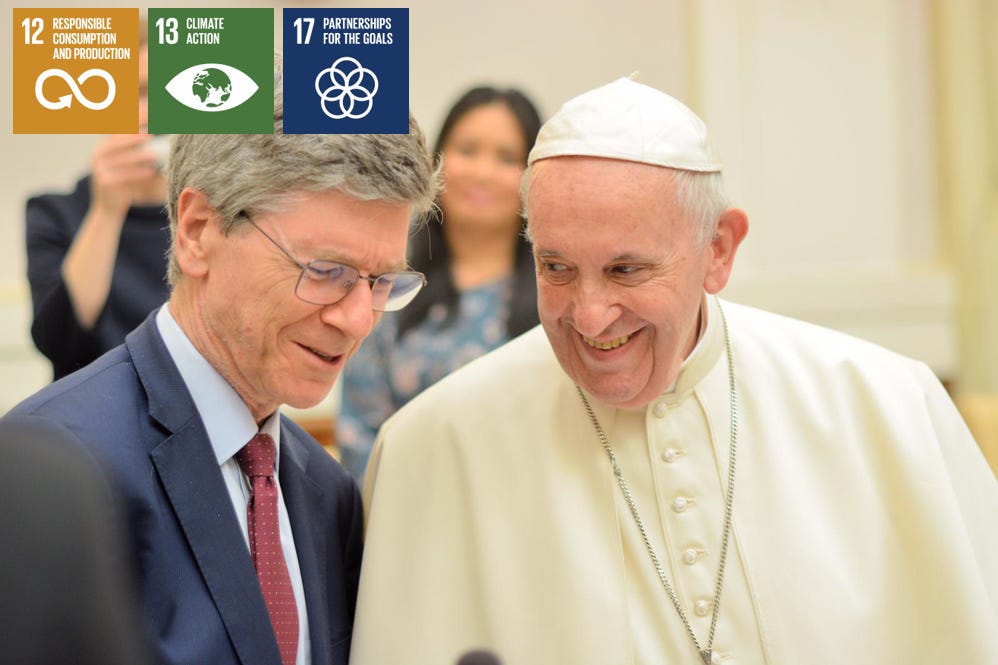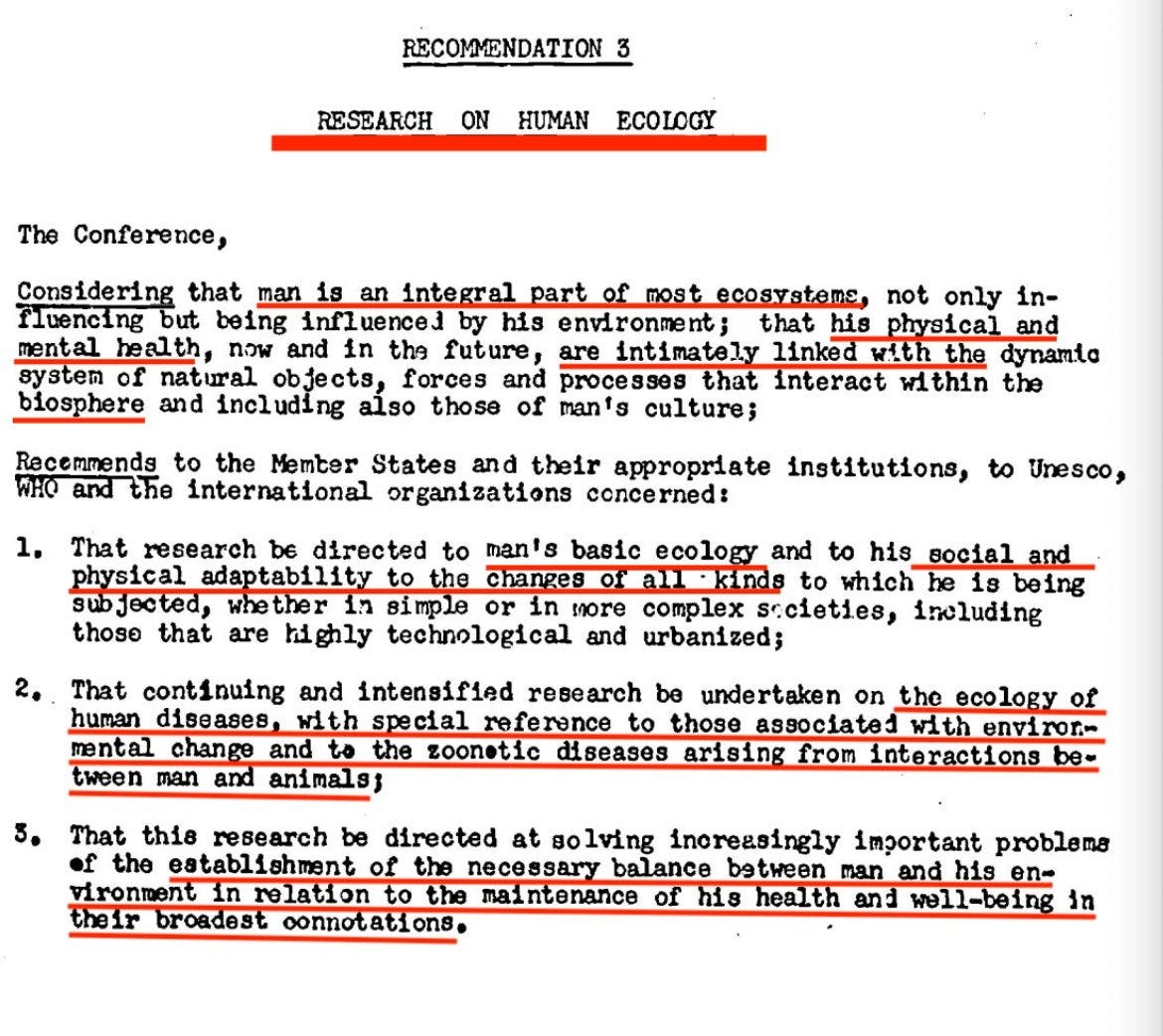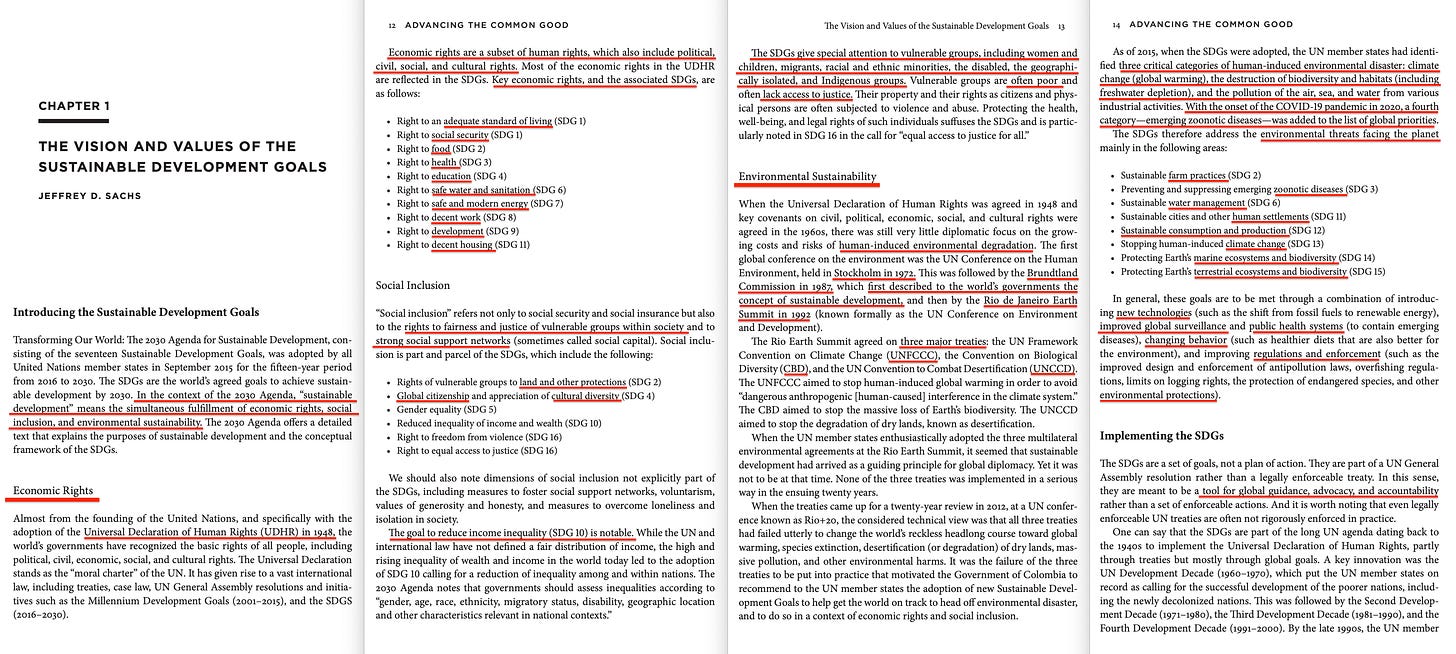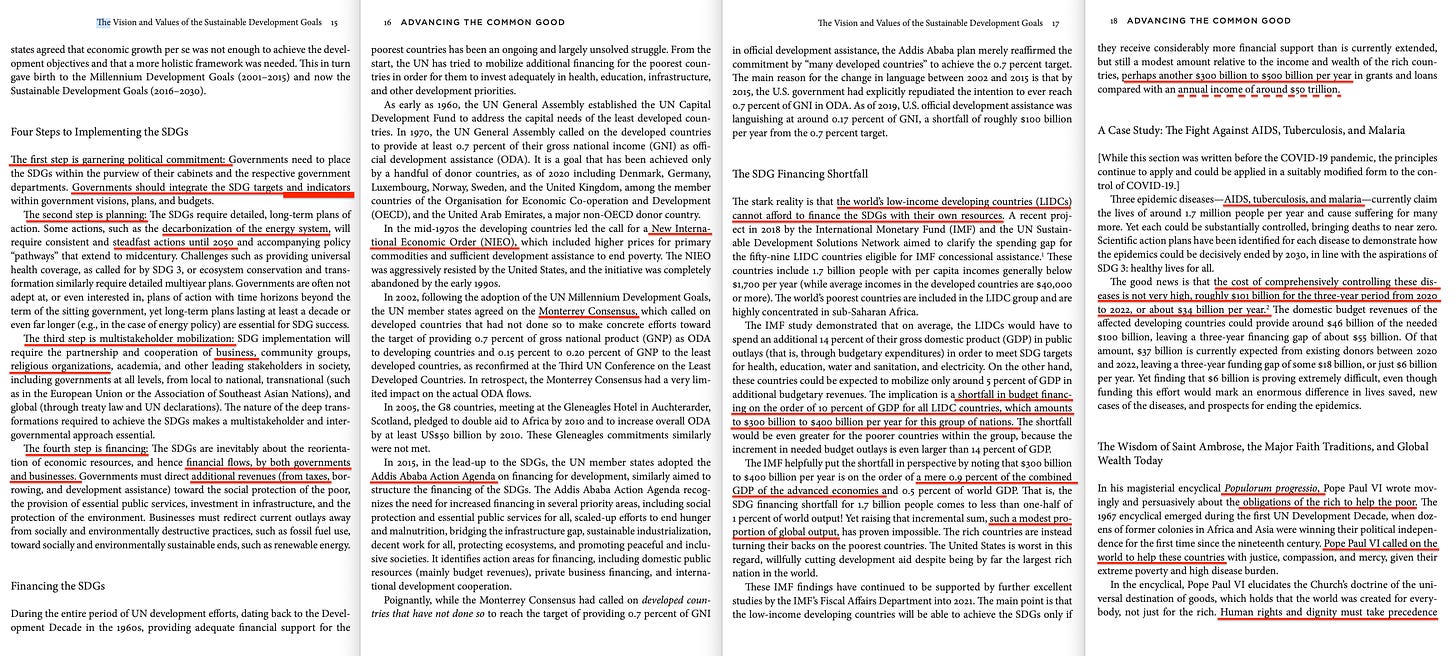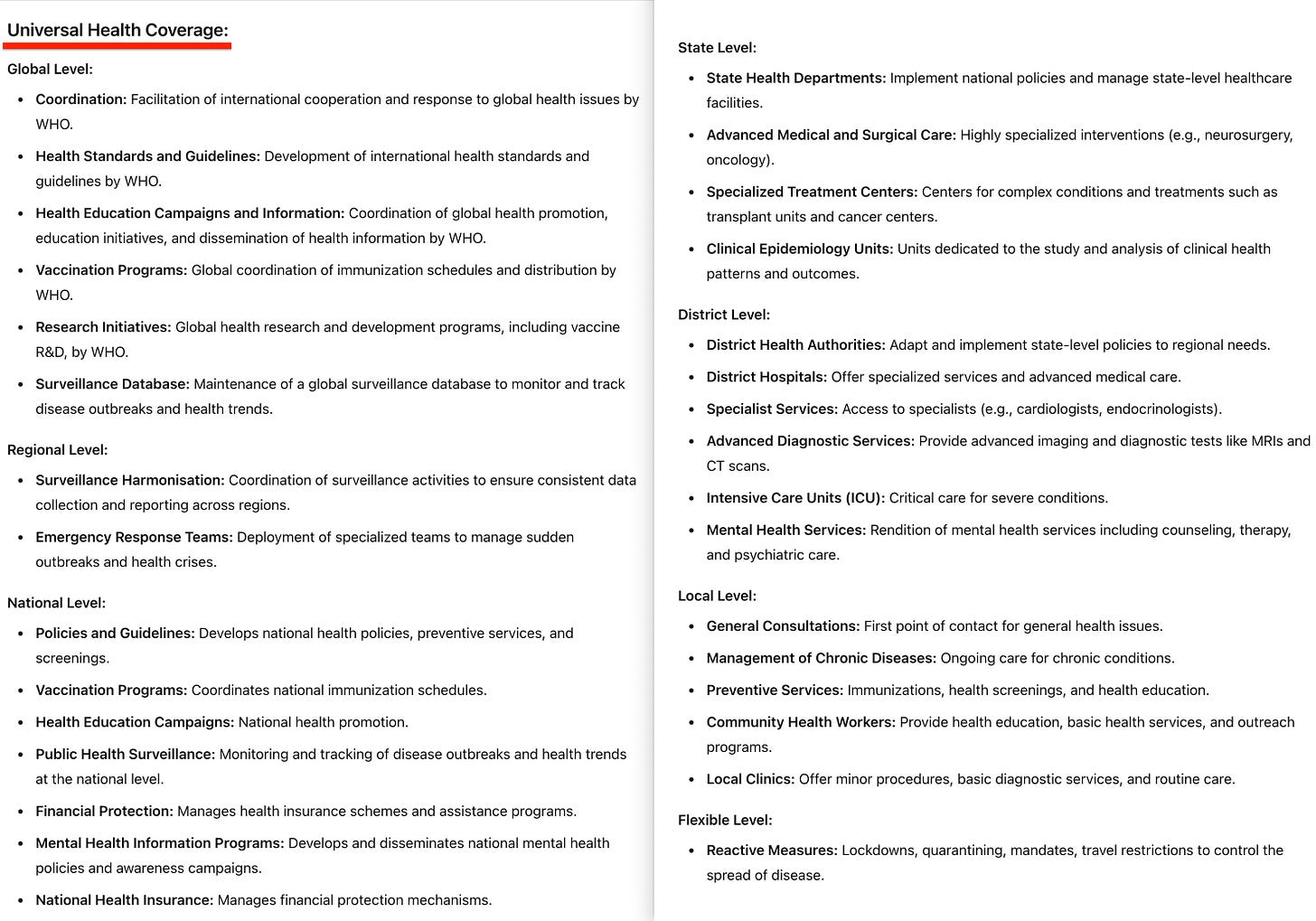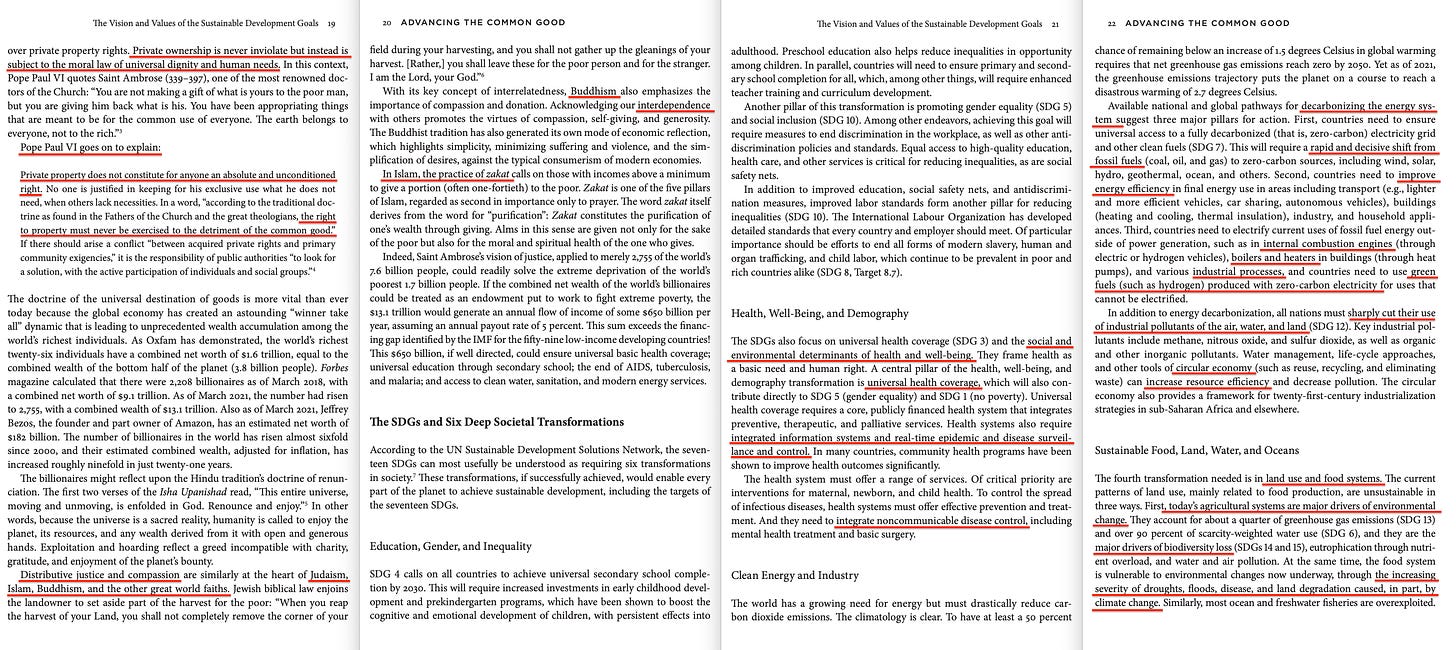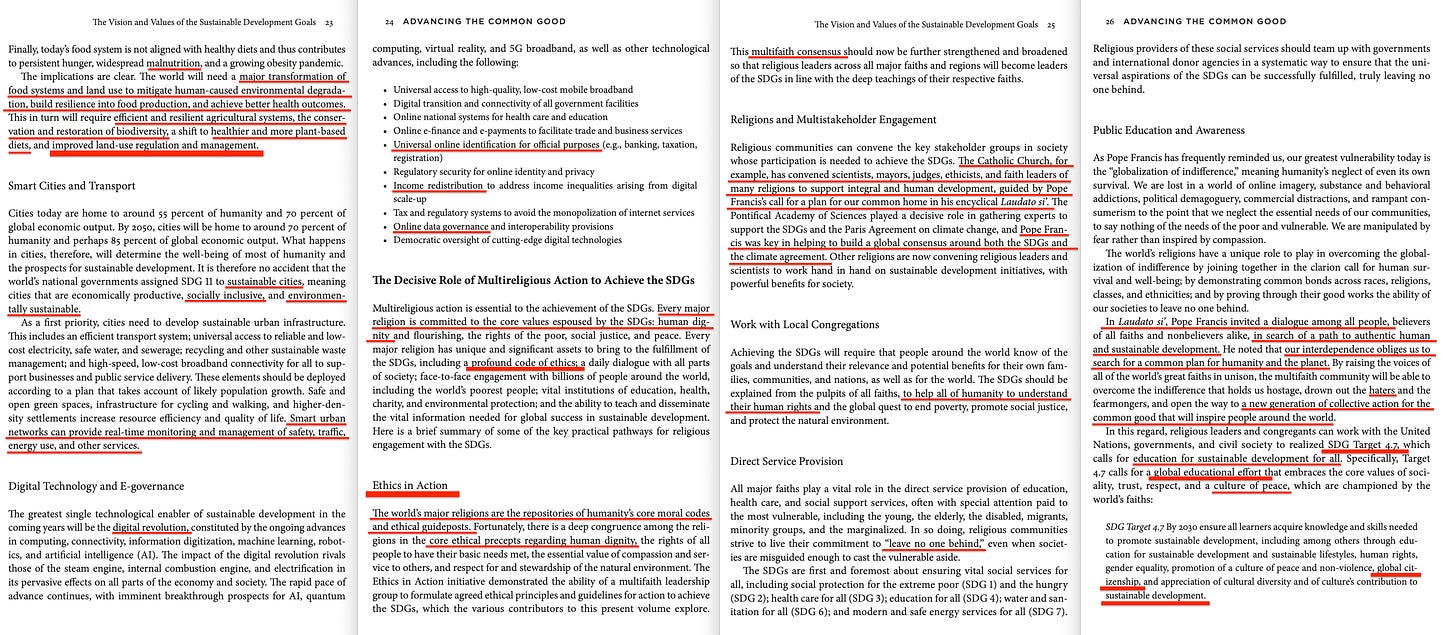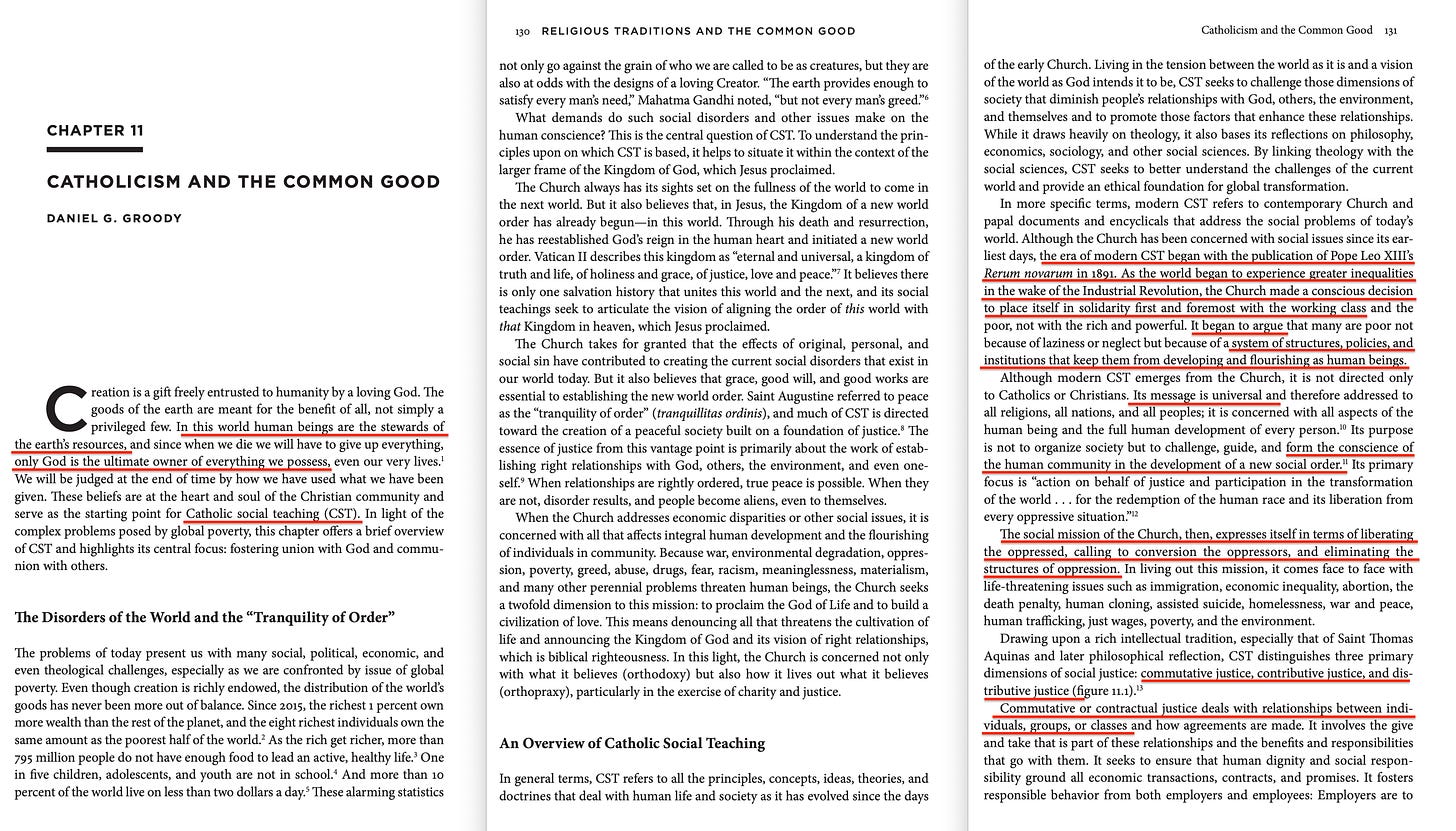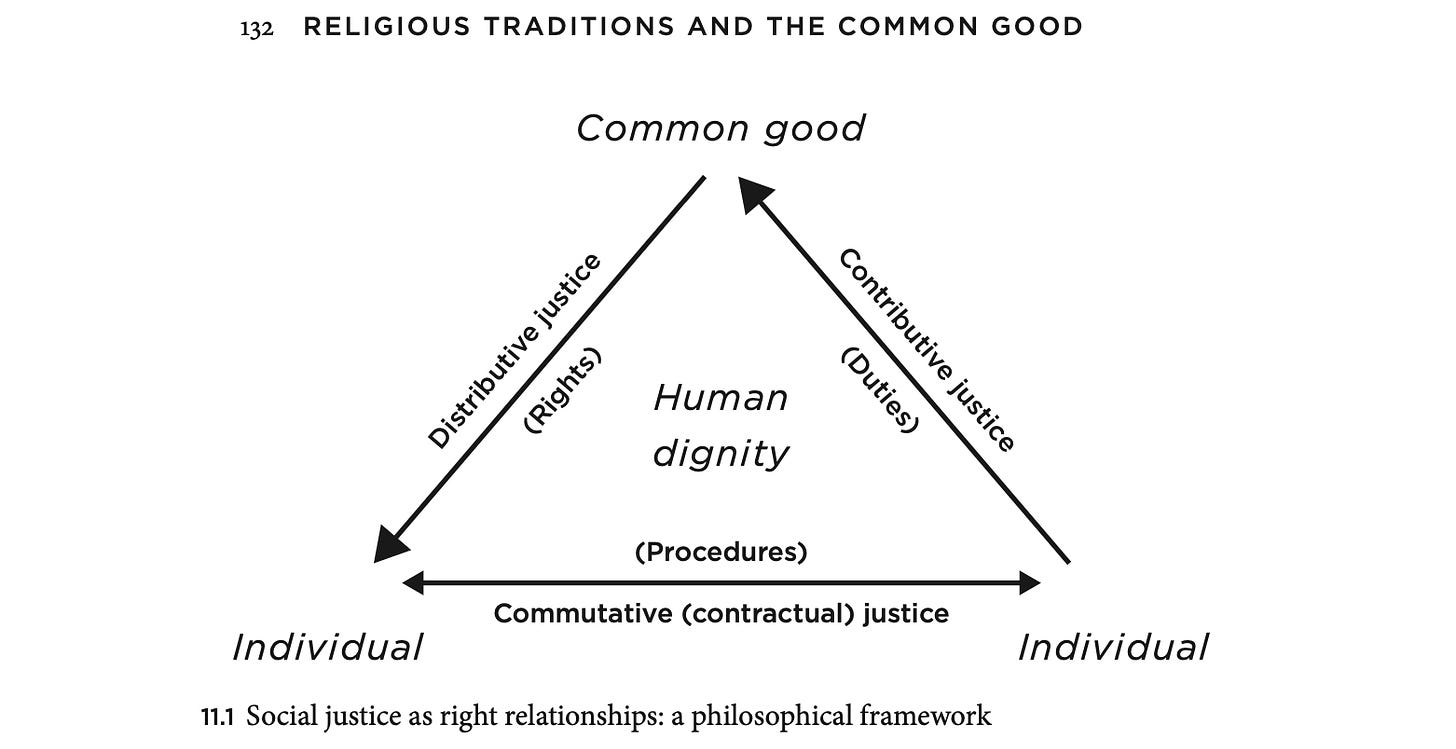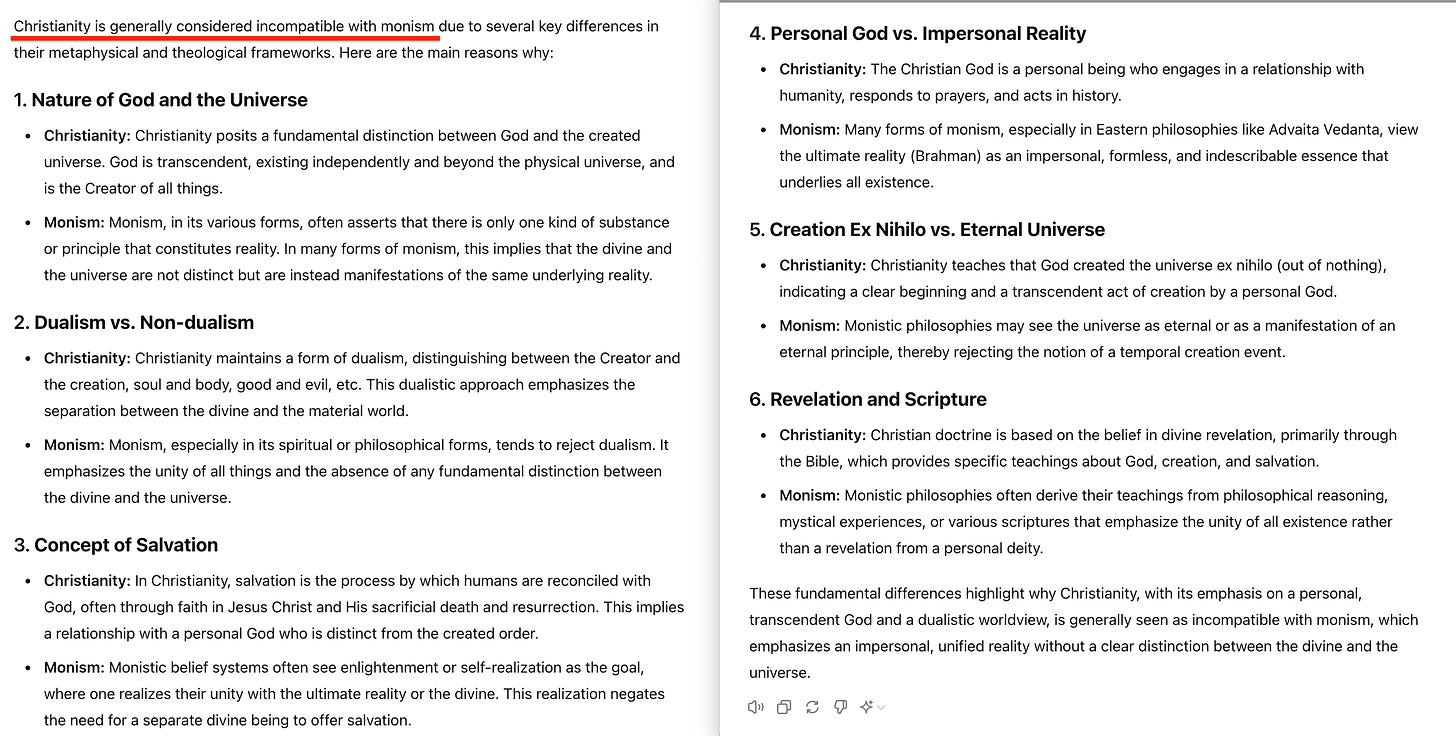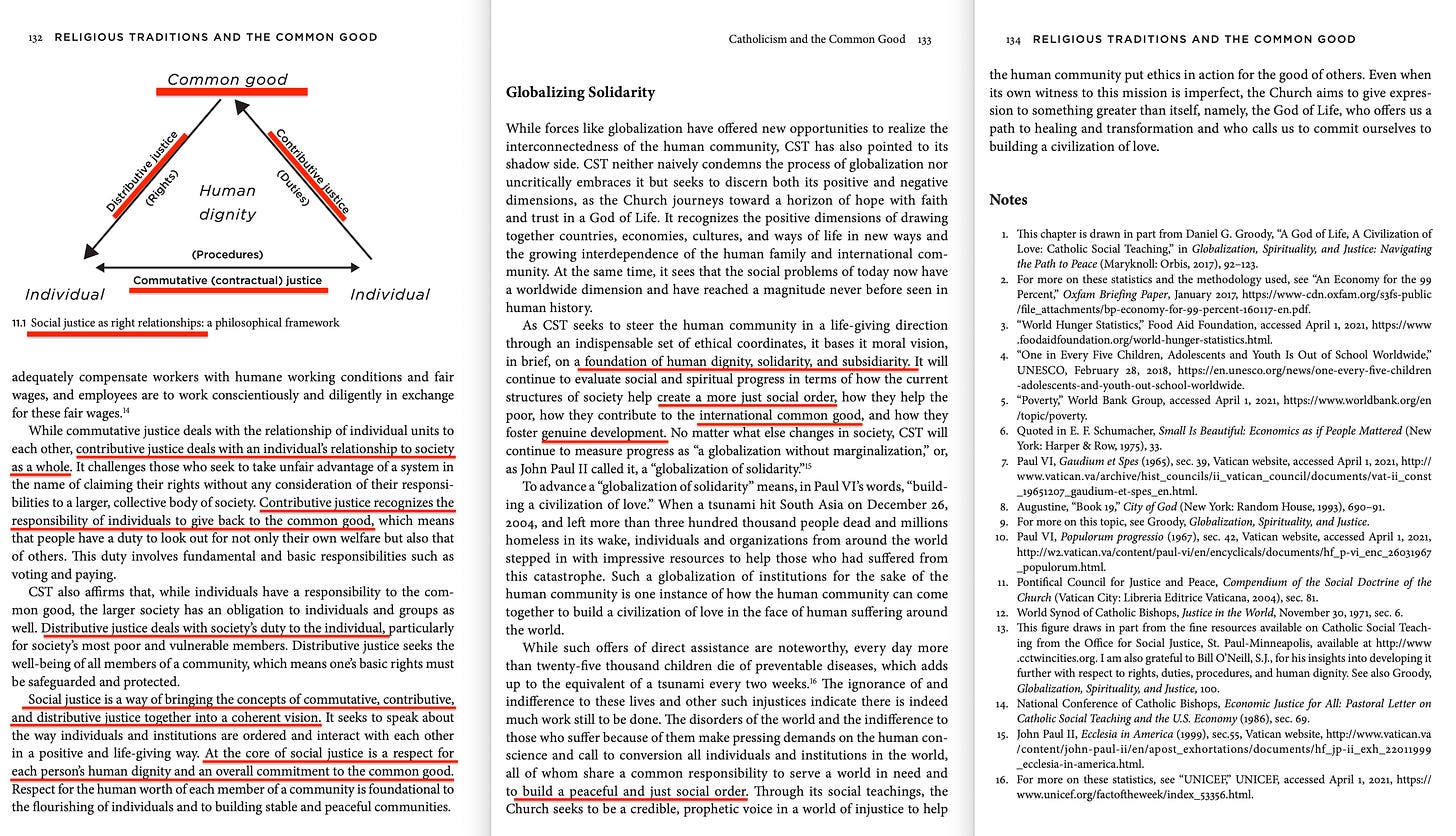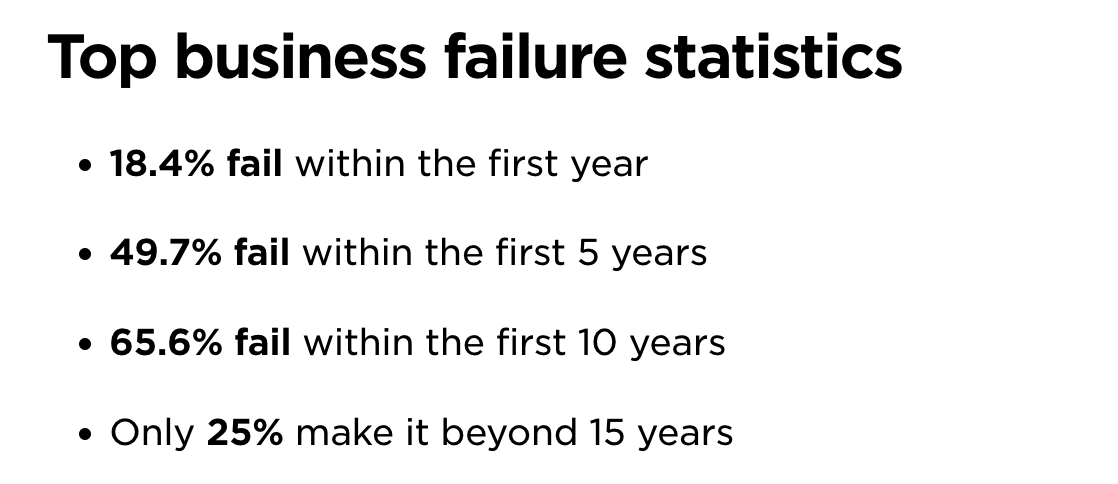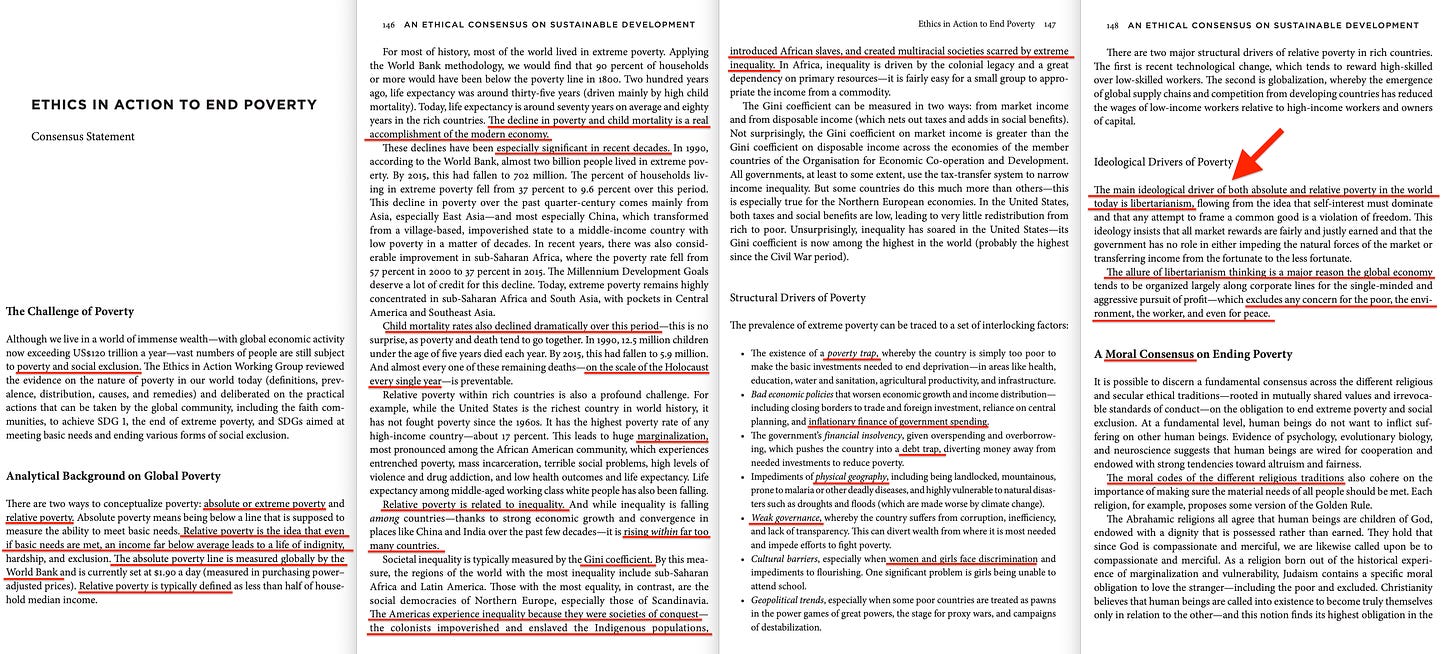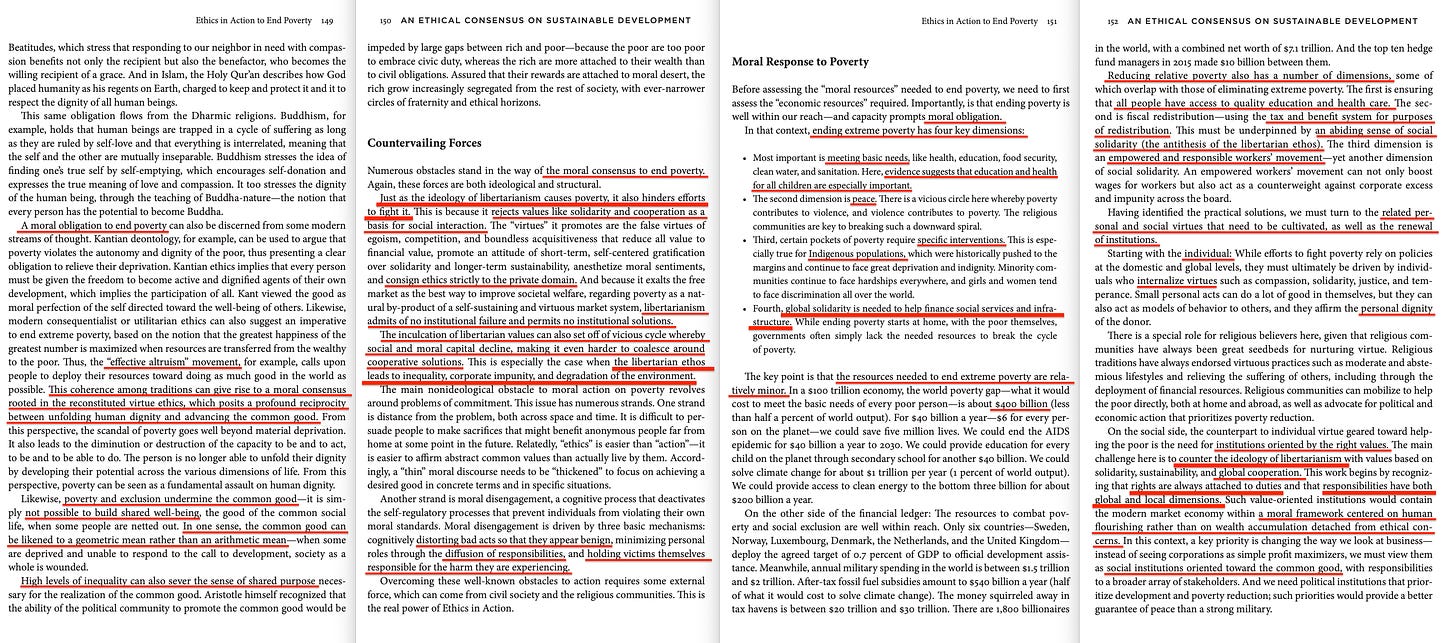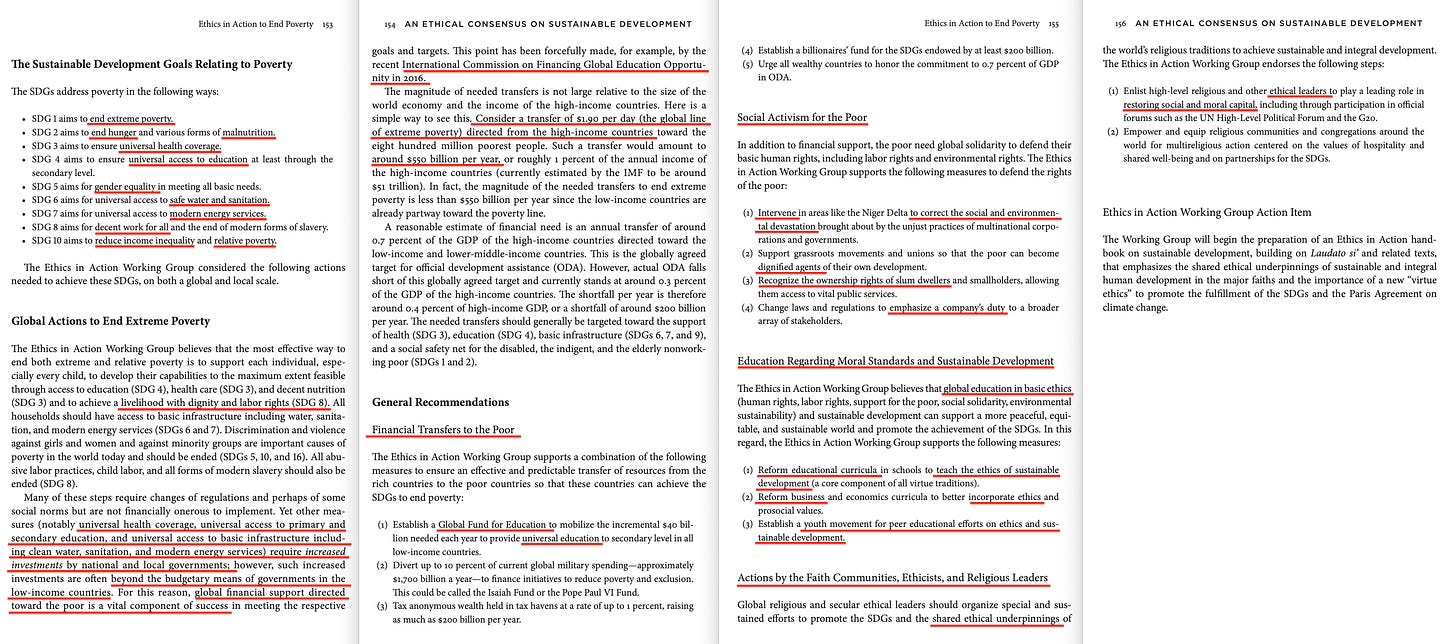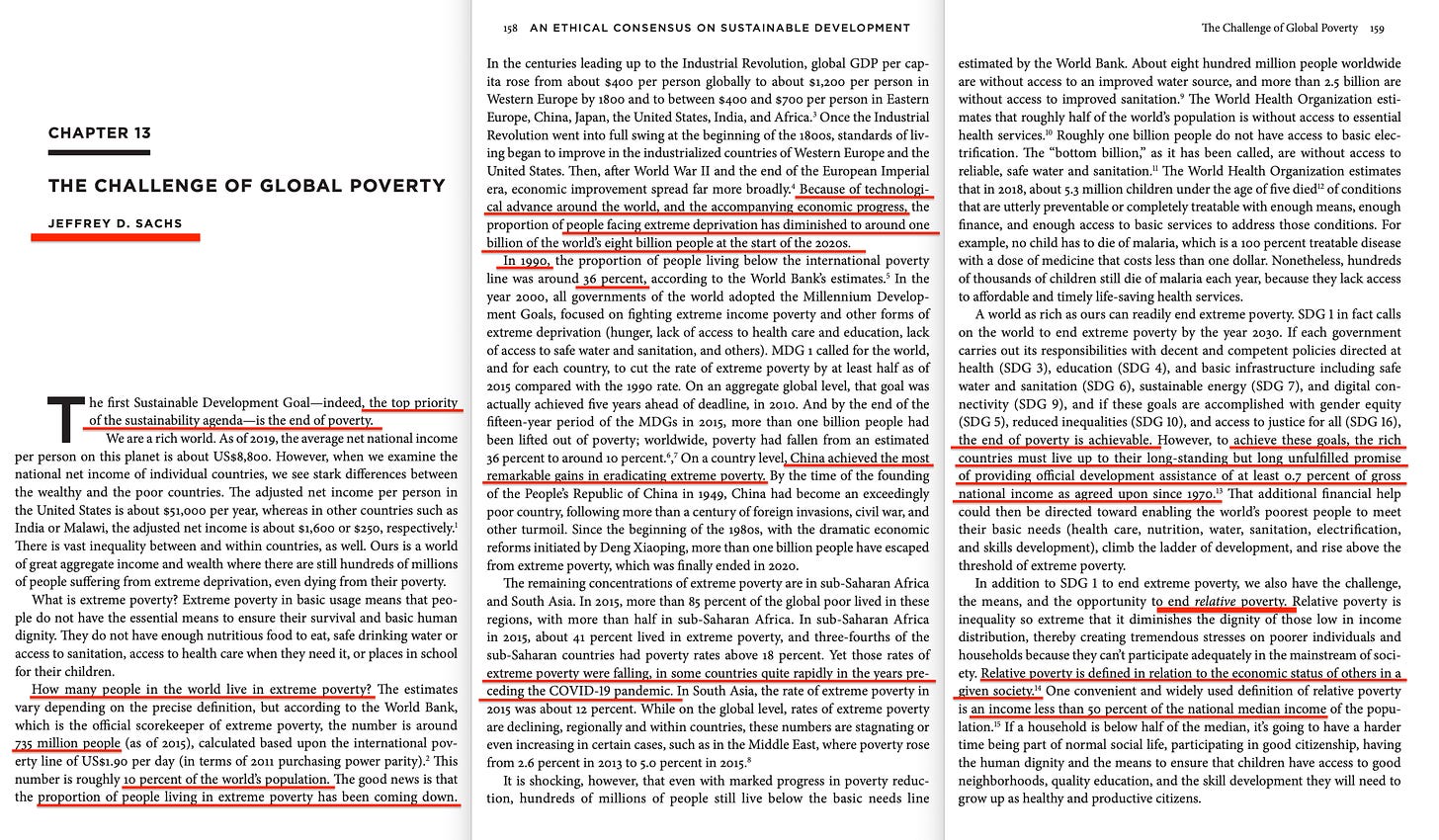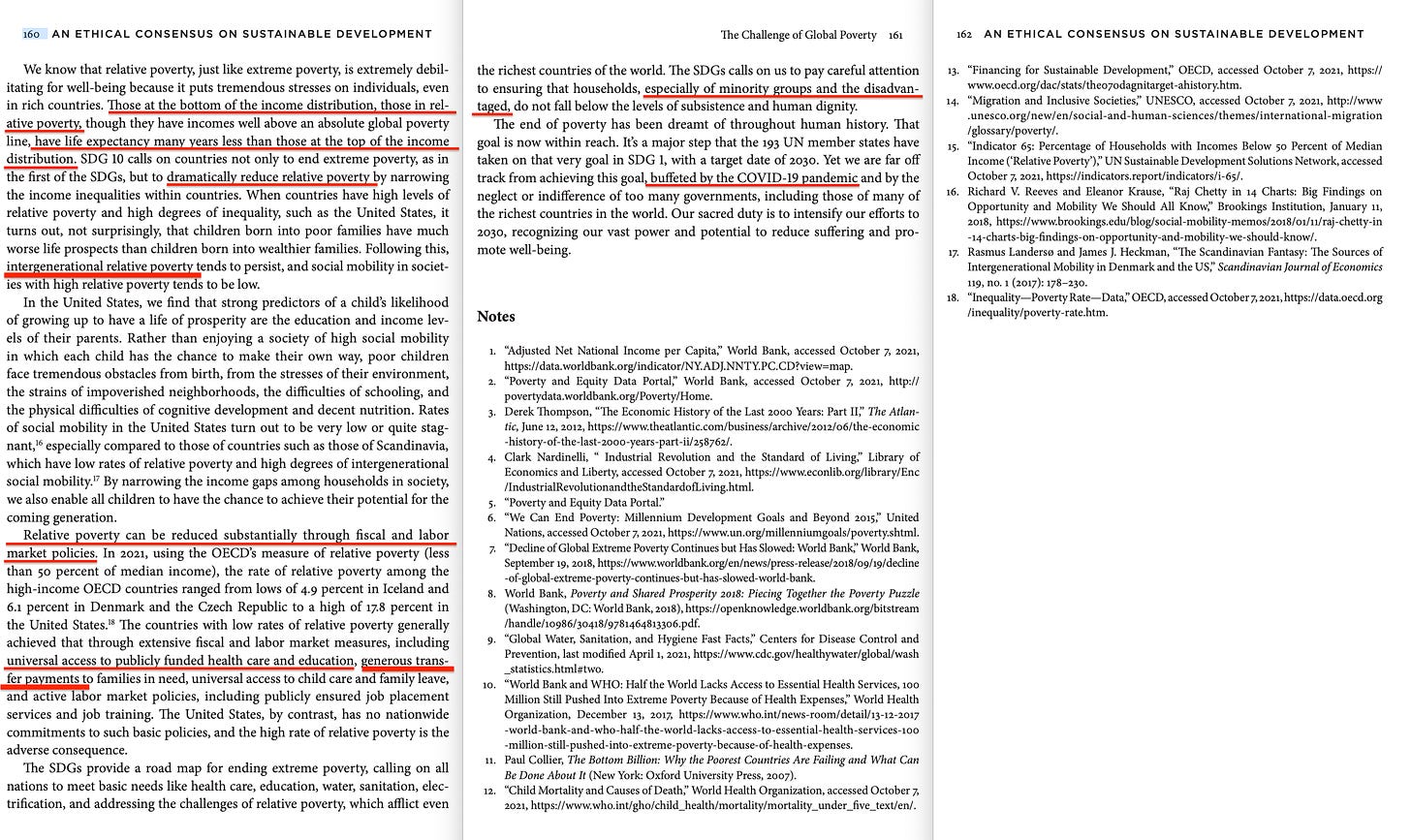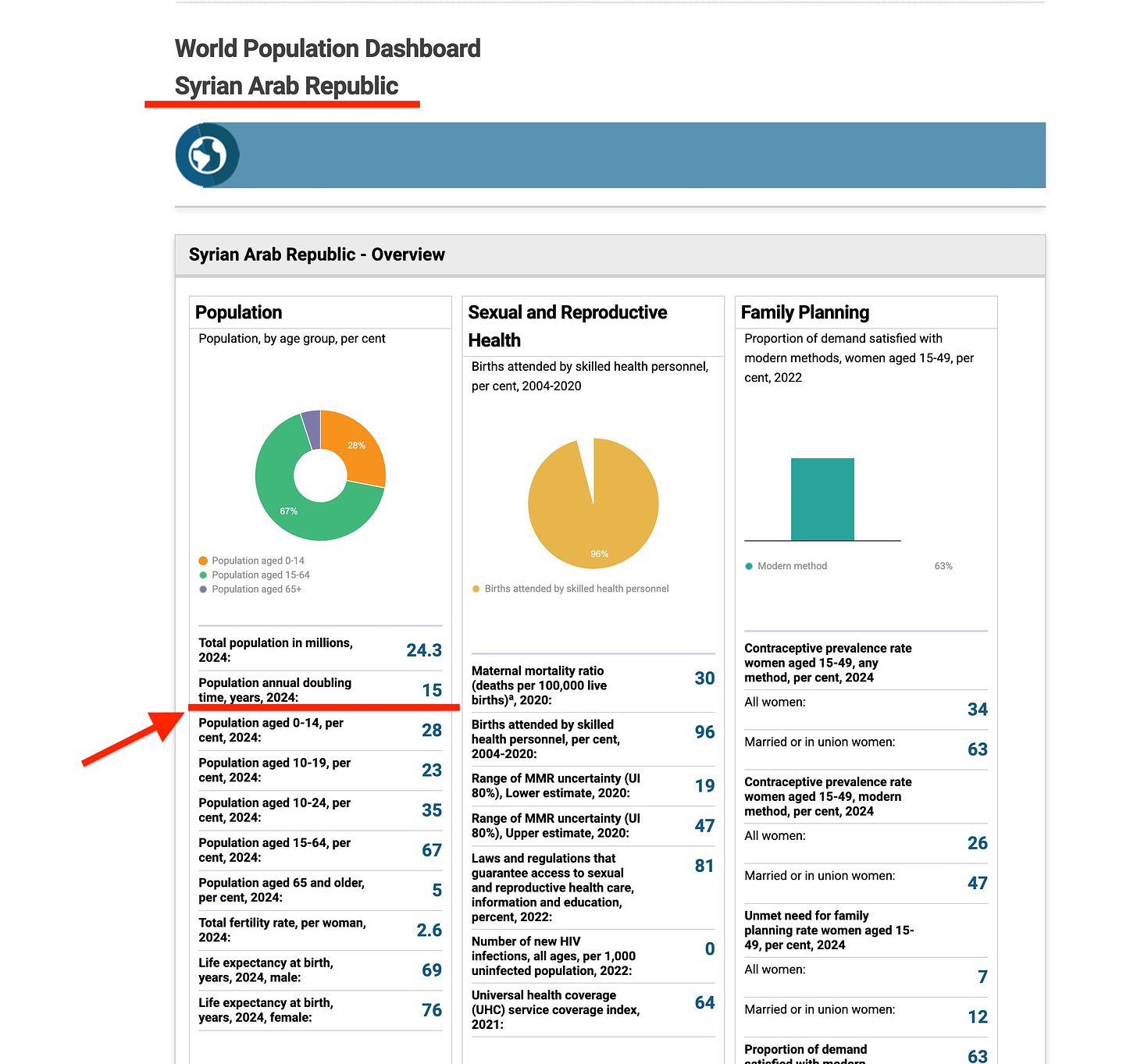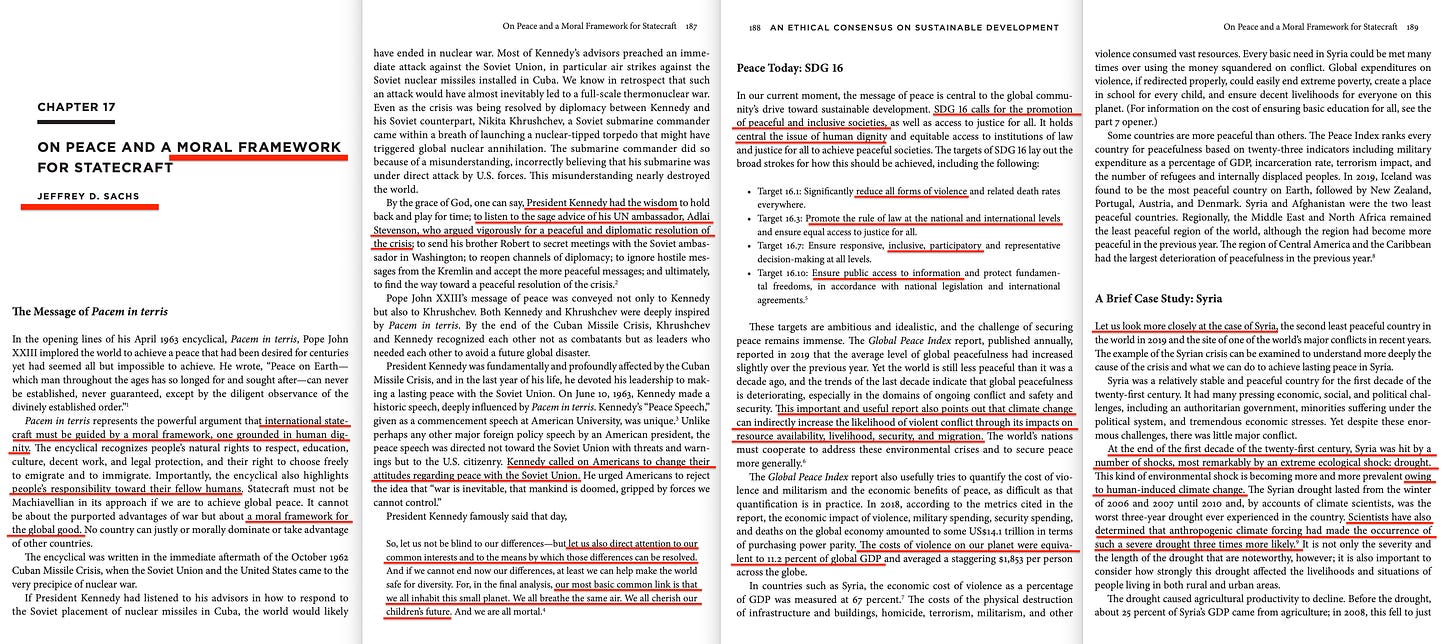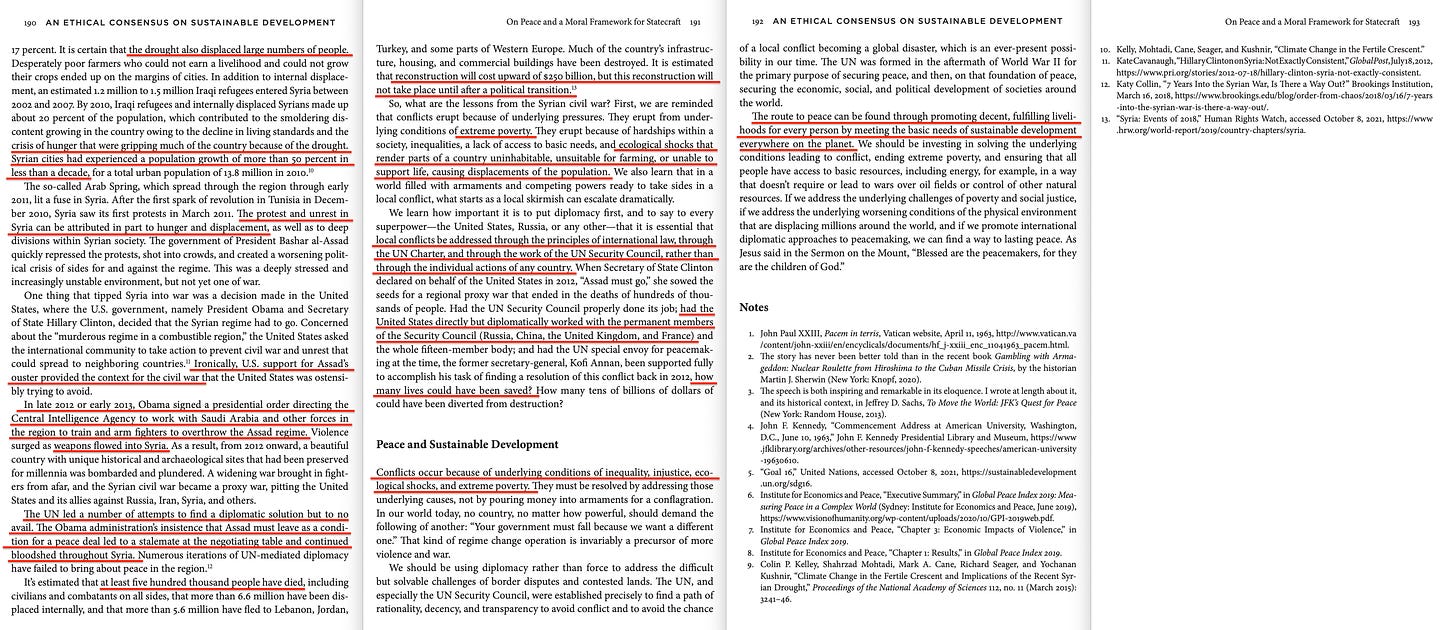We went through the overview. Now, it’s time to drill into individual chapters, and thus, the specifics of Paul Carus’s creation which very gradually led to religious tradition being replaced by scientific rationalism - where the science on display is of the grade experienced during Covid-19.
And Jeffrey Sachs is the belle of the ball.
The first part can be found here.
One reason why doing the conclusion first and then revisiting the earlier chapters later works well, is because it gives you an opportunity to only dedicate time and space to things which stand out in those individual chapters. And given how infuriating this entire book is, that’s a good thing, because there are so many issues worthy of attention, yet my time is limited. In fact, what was supposed to be a second article on the matter developed into yet another behemoth, quite simply because there’s so much extremely contentious material on display, and scarcely a single chapter doesn’t appear to exhibit what can best be described as strongly anti-American views. So let’s begin.
Chapter 1 - by Sachs himself - is on the ‘Vision and Values of the Sustainable Development Goals’.
He starts off by detailing the applicability of the various SDGs, and in general flashes hints at how most of said SDGs… appear wishful thinking beyond all. And that’s probably got a dual purpose - because on one hand, they appear somewhat toothless to the occasional observer, because they are in fact meant to facilitate the creation of arbitrary, ever-changing ‘ethics’ principles through their intersection with the various frameworks on ‘human rights’. But picking up from page 14 we get -
‘As of 2015, when the SDGs were adopted, the UN member states had identified three critical categories of human-induced environmental disaster: climate change (global warming), the destruction of biodiversity and habitats (including freshwater depletion), and the pollution of the air, sea, and water from various industrial activities. With the onset of the COVID-19 pandemic in 2020, a fourth category—emerging zoonotic diseases—was added to the list of global priorities.‘
This, of course, is no coincidence. See, it’s right there, in the 1968 UNESCO Biosphere Conference Recommendation 3.2 - right above the call to ‘establish man’s balance with nature’ - incidentally penned by Rockefeller’s Rene Dubos.
And by sheer coincidence - the principal author of this book was Owen Flanagen1, a former Rockefeller Fellow at the National Humanities Center.
Sachs then outlines how the SDGs translate into sustainability, before detailing -
‘… these goals are to be met through a combination of introducing new technologies (such as the shift from fossil fuels to renewable energy), improved global surveillance and public health systems (to contain emerging diseases), changing behavior (such as healthier diets that are also better for the environment), and improving regulations and enforcement (such as the improved design and enforcement of antipollution laws, overfishing regulations, limits on logging rights, the protection of endangered species, and other environmental protections).‘
In other words - through legislation, manipulative behavioural science, hopeful replacements of infrastructure, and global surveillance.
Especially that last bit. They are very, very keen on that, as I have repeatedly detailed.
We then have four steps to implementing the SDGs, through -
Targets and indicators
These indicators are looped into global surveillance, along with the Determinants of Health, Aichi Target biodiversity indicators, and so forth.Planning, ie Net Zero by 2050
Clearly on track.Multistakeholder mobilisation (business, religious communities, …)
In line with Kofi Annan’s ‘reforms’ of the United Nations, which enable ‘stakeholder approach’ trisectoral governance.Financing
Blended Finance initiatives, ripping off the Western taxpayer.
But - of course - we also discover that they need money, which especially is expected to come out of the wallet of the Western taxpayer - ultimately leading to an estimate of $300-500bn/yr. Of course, should said target be actually be achieved, the goalpost will immediately be moved - it’s how these crooks do these things. It does not matter in the slightest how much we spend, it’s never enough for these vultures, because the objective is to drain Western nations.
But we’ll set aside Sachs’ repeated attempts to guilt trip the occasional Christian reader into accepting his outrageous proposition, through the continuous inclusion of cherry picked religious quotes, which amazingly always appear to be of the Christian varity - in spite of this book - allegedly - being an appeal to seven religions.
This, very much, is a continuous theme. Once you spot it, it’s everywhere.
And having said that, this particular one stands out -
‘Human rights and dignity must take precedence over private property rights. Private ownership is never inviolate but instead is subject to the moral law of universal dignity and human needs‘
Ie, confiscate lands in the name of 'ethics’, as fabricated through intentionally falsified ‘science’, run through a socialist interpretation of ‘human rights’.
Do feel free to correct me, Jeff - I’d like to hear you detail explicit circumstances. Alternatively, perhaps you want to distance yourself from this quote, claiming these are the words of the Pope, and you are simply the messenger in this regard - in which case I’d like to request everyone ignore Jeff’s manipulative appeal to Christian morality. Which one will it be, Jeff?
Page 21 continues -
‘The SDGs also focus on universal health coverage (SDG 3) and the social and environmental determinants of health and well-being.’
The Determinants of Health I covered previously; they are in short ‘indicators’ to be integrated with the global surveillance system. These will further be useful for purposes of bringing about Universal Health Coverage.
And let me show you what Universal Health Coverage means, a component of which is Primary Healthcare. It’s an explicit, top-down hierarchical reorganisation of health, where those at the very top control the global public health surveillance information, the vaccination programs, information, and education. Actual rendered services… nah, those are for your local community to sort out.
’Health systems also require integrated information systems and real-time epidemic and disease surveillance and control. In many countries, community health programs have been shown to improve health outcomes significantly.‘
And there’s an explicit mention of global surveillance, which already existed during the scamdemic (EO4HEALTH)2. Further, the DoD-GEIS fits the bill rather well - and through NATO - also ties in with the Moynihan memo of Sep 17, 1969.
‘The fourth transformation needed is in land use and food systems. The current patterns of land use, mainly related to food production, are unsustainable in three ways. First, today’s agricultural systems are major drivers of environmental change. They account for about a quarter of greenhouse gas emissions (SDG 13) and over 90 percent of scarcity-weighted water use (SDG 6), and they are the major drivers of biodiversity loss (SDGs 14 and 15), eutrophication through nutrient overload, and water and air pollution. At the same time, the food system is vulnerable to environmental changes now underway, through the increasing severity of droughts, floods, disease, and land degradation caused, in part, by climate change‘
The most frustrating part of this is that - sure - this does contains grains of truth. But what he neglects to tell you is that it’s hugely location dependent. And as for the ‘increasing severity’, that lie has been parroted for certainly the past 32 years by now.
But because of those grains of truth, it becomes hard to explain and ultimately convince those, suffering under the delusional condition resulting from years of MSM and ‘educational’ brainwashing, who genuinely believe that we all will die in a burning lake of fire (again), should we not immediately accept anything and everything with the word ‘green’ in its title… in fact - from personal experience - even see it fit to attack anyone who dares question said ‘Green Policies’, EVEN THOUGH those people never actually bothered reading said policy frameworks, and thus in effect are completely ignorant on the topic.
It’s faith. It’s hope. It’s a quack religion, typically practiced by those insisting to tell you how much they ‘hate religion’ (yet refusing to criticise anything but Christianity).
But Sachs… Sachs… Sachs… do attempt to dig yourself out of this one -
‘The implications are clear. The world will need a major transformation of food systems and land use to mitigate human-caused environmental degradation, build resilience into food production, and achieve better health outcomes. This in turn will require efficient and resilient agricultural systems, the conservation and restoration of biodiversity, a shift to healthier and more plant-based diets, and improved land-use regulation and management‘
Please do be so kind and in detail explain how this would work. Should this be through the 12 Malawi Principles perchance, also known as the Ecosystem Approach?
Because the system described by the Ecosystem Approach is stakeholder feudalism.
We’re almost done with the longest chapter in the book - just a few more… atrocities… in the section on ‘Smart Cities and Transport‘ we see - ‘Smart urban networks can provide real-time monitoring and management of safety, traffic, energy use, and other services.‘, which of course is even more surveillance data for the global surveillance system.
The comes ‘Digital Technology and E-governance‘, where - though smart enough to not state it outright - ‘Universal online identification for official purposes‘ clearly relate to Digital ID. Then follows -
‘Every major religion is committed to the core values espoused by the SDGs: human dignity and flourishing,… Every major religion has unique and significant assets to bring to the fulfillment of the SDGs, including a profound code of ethics‘
Well, … apart from the 40% of Christianity who they didn’t invite. Oh, and this is about that common code of ethics. Clearly, ‘exclusion’ is in that common code. But that’s not all we find.
‘The world’s major religions are the repositories of humanity’s core moral codes and ethical guideposts. Fortunately, there is a deep congruence among the religions in the core ethical precepts regarding human dignity, the rights of all people to have their basic needs met, the essential value of compassion and service to others, and respect for and stewardship of the natural environment. The Ethics in Action initiative demonstrated the ability of a multifaith leadership group to formulate agreed ethical principles and guidelines for action to achieve the SDGs, which the various contributors to this present volume explore.‘
… again, of course, apart from said 40% of Christianity who Jeff found ‘ethic‘ to exclude from their ‘inclusive’, ‘participatory’ and ‘transparent’ process.
‘This multifaith consensus should now be further strengthened…‘
That’s great - you do that. I am unironically in fully support here. What I suggest is that the 40% of Christianity excluded from Jeff’s ‘ethic’ and ‘participatory’ process, which led to the creation of this report should wholesale ignore absolutely everything out of this fraudulent stitch-up, penned by outright crooks.
‘The Catholic Church, for example, has convened scientists, mayors, judges, ethicists, and faith leaders of many religions to support integral and human development, guided by Pope Francis’s call for a plan for our common home in his encyclical Laudato si’. The Pontifical Academy of Sciences played a decisive role in gathering experts to support the SDGs and the Paris Agreement on climate change, and Pope Francis was key in helping to build a global consensus around both the SDGs and the climate agreement‘
I can’t even be bothered to investigate. I can absolutely assure you that all those ‘stakeholders’ hand-picked to ‘participate’ in their ‘inclusive’ process were 100% in alignment with Jeffrey Sachs on this one. In fact, he probably served in the capacity of cherry picking said ‘stakeholders’ as well. All of this heaves of severe corruption, through and through; the express opposite of ‘ethical behaviour’.
I incidentally investigated the composition of just such a panel a while back, and the corruption was quite simply beyond comprehension. Everyone was hand picked for their opinions, in short. No, really - EVERYONE.
‘The SDGs should be explained from the pulpits of all faiths, to help all of humanity to understand their human rights‘
… and duties, no doubt.
‘… religious communities strive to live their commitment to “leave no one behind,” even when societies are misguided enough to cast the vulnerable aside.‘
… complete with arbitrary definitions of ‘vulnerable’ and ‘misguided’. But - sure - if the Vatican is so concerned with their ‘human rights’ (and duties) yet not ours, and want to import 100 million economic migrants, then they can host them all at the Vatican, who should also accept the responsibility for feeding and housing said.
‘In Laudato si’, Pope Francis invited a dialogue among all people, believers of all faiths and nonbelievers alike…’
… again, unless they belong to the excluded 40% of Christianity who’d disagree… or harbour a ‘20th century mindset’…
’… in search of a path to authentic human and sustainable development.’
What does ‘authentic’ even mean? Does it perchance mean as ruled by one of Sachs’ Marxist pals, who per ‘intersectionality’ criteria will judge you on explicitly racist and sexist criteria?
’… the indifference that holds us hostage, drown out the haters and the fearmongers’
I’m pretty sure you ‘ethically’ declined to invite said ‘haters’.
’… and open the way to a new generation of collective action for the common good that will inspire people around the world.’
Wait, let me ChatGPT that for you…
’SDG Target 4.7… calls for a global educational effort…, which are championed by the world’s faiths: …, global citizenship, and appreciation of cultural diversity and of culture’s contribution to sustainable development‘
Global Citizenship through Global Education.
And though Chapter 11 - ‘Catholicism and the Common Good’ in some ways is slightly off the mainline narrative here, I am including it because it is absolutely spectacular, though for quite unexpected reasons -
‘… the era of modern CST began with the publication of Pope Leo XIII’s Rerum novarum in 1891. As the world began to experience greater inequalities in the wake of the Industrial Revolution, the Church made a conscious decision to place itself in solidarity first and foremost with the working class and the poor, not with the rich and powerful. It began to argue that many are poor not because of laziness or neglect but because of a system of structures, policies, and institutions that keep them from developing and flourishing as human beings.‘
That’s… essentially a Marxian argument. And it drags in the 1891 reforms. Consider my interest well and truly peaked (but outside scope of this article, obviously).
‘Although modern CST emerges from the Church, … message is universal… purpose is not to organize society but to challenge, guide, and form the conscience of the human community in the development of a new social order.‘
A universal… critique?… with the aim to develop a new social order?????
‘The social mission of the Church, then, expresses itself in terms of liberating the oppressed, calling to conversion the oppressors, and eliminating the structures of oppression‘
… and as I sit here in stunned disbelief at this not being penned by the Frankfurt School3, it continues -
‘CST distinguishes three primary dimensions of social justice: commutative justice, contributive justice, and distributive justice. Commutative or contractual justice deals with relationships between individuals, groups, or classes…‘
I didn’t know this, but apparently, they subdivided ‘social justice’ into 3 categories, first of which is ‘commutative justice’, dealing with interpersonal (or group) dealings…
… but we further find that all three are arranged as a philosophical rights framework…
‘… contributive justice deals with an individual’s relationship to society as a whole… recognizes the responsibility of individuals to give back to the common good, …‘
… and…
‘Distributive justice deals with society’s duty to the individual, …‘
… and social justice breaks down into rights (distributive justice), duties (contributive justice), and procedures (commutative justice), with human dignity being at the core of said social justice, we see that this all ultimately places the individual relative to the ‘common good’.
A picture truly is worth 1,000 words, because when you see it arranged like this, you can almost hear the internal, audible ‘click’ -
‘Social justice is a way of bringing the concepts of commutative, contributive, and distributive justice together into a coherent vision. It seeks to speak about the way individuals and institutions are ordered and interact with each other in a positive and life-giving way. At the core of social justice is a respect for each person’s human dignity and an overall commitment to the common good‘
Brilliant! The Marxists have expanded a system where… a commie judge will rule against you, to a new system where… THREE commie judges will rule against you.
Now, that’s progress you can take with you to the gulag!
‘As CST seeks to steer the human community in a life-giving direction through an indispensable set of ethical coordinates, it bases it moral vision, in brief, on a foundation of human dignity, solidarity, and subsidiarity. It will continue to evaluate social and spiritual progress in terms of how the current structures of society help create a more just social order, how they help the poor, how they contribute to the international common good, and how they foster genuine development‘
… yeah ethics, morals, and an ‘international common good’… of course, with slight rephrasing that could become ‘common good international’, which we could then shorten to ‘ComIntern’… oh wait4.
Amusements aside, it does somewhat explain ‘Christian Socialism’, the ‘Utopian Socialists’, and those other - on the surface appearing very confused - groups which formed in the 19th century. Of course, we still have the ’slight’ issue of integrating monism with Christianity in general…
Next up is quite possibly the very worst and most infuriating chapter of the lot, in fact, I find it shocking because it really is at odds with... well, we’ll get to that. It’s ‘Ethics in Action to End Poverty’.
‘There are two ways to conceptualize poverty: absolute or extreme poverty and relative poverty. Absolute poverty means being below a line that is supposed to measure the ability to meet basic needs. Relative poverty is the idea that even if basic needs are met, an income far below average leads to a life of indignity, hardship, and exclusion.’
Relative poverty, then, becomes a matter of a threshold. And that - arbitrary - threshold can ultimately be used to drive income inequality - to extinction. Now, sure, you can table a range of arguments here, because income inequality might well be too high - I get it. But when you go by the general gist of this book, there is absolutely no way I would trust these crooks to not deliver us to Utopian Marxism. All required is for the ‘relative poverty threshold’ to be progressively adjusted to become, say, 95% of average household income... too far fetched, you say?
’The absolute poverty line is measured globally by the World Bank and is currently set at $1.90 a day (measured in purchasing power– adjusted prices). Relative poverty is typically defined as less than half of household median income.‘
And the absolute poverty line is yet another threshold, this one set by the World Bank. Again, same argument applies - through driving the threshold continuously in one direction, this can absolutely be abused in much the same way - though, in fairness, not as easily as said ‘relative poverty’.
But as for the relative poverty threshold… that is already set to 50%! This essentially implies that a factor of 2x from low to middle income. Should they then add a similar cap going from middle to - alleged - top (a logical next step), then you’ll experience a society with a 4x delta from top income levels to bottom, which is absolutely not high. But the point is that as it’s an external threshold, which can gradually be used to narrow the gap, and thus ultimately serving to eliminate the primary drive for entrepreneurial activity - which, historically, has never led anywhere good.
But as for a threshold of 4x between the highest income earner and lowest - this certainly won’t be anywhere near enough to compensate for risk-to-reward ratios taken by entrepreneurs5. How would you even be able to accumulate the capital (save) to fund your own venture over that time, as you can easily go for a year or two without income in many, many fields?
The chapter then straddles the absurdly ideologically inconsistent, because while it accepts that ‘The decline in poverty and child mortality is a real accomplishment of the modern economy‘, it then adds ‘By 2015, this [child mortality] had fallen to 5.9 million. And almost every one of these remaining deaths—on the scale of the Holocaust every single year.‘
… so first, it’s a ‘real accomplishment’, and then it’s a ‘holocaust every year’?
Look, deaths are tragic, no-one will disagree - but what the document essentially suggests, is that a unicorn will appear, snap its fingers… or hooves, whatever… and magically, all issues will be solved with immediate effect. It’s ridiculous, because the real world doesn’t operate like that, and these issues are far more complex - but the Marxist undertone carries on regardless -
‘The Americas experience inequality because they were societies of conquest— the colonists impoverished and enslaved the Indigenous populations, introduced African slaves, and created multiracial societies scarred by extreme inequality‘
When you read this document, you will notice that Jeffrey Sachs repeatedly steers clear of criticising, ie, China - but the United States is fair game. And think about it - requesting that you for a second set aside your own, personal beliefs or understandings - he’s against the narrative wrt NordStream, against the narrative on Syria, against the narrative on Ukraine, and golly gee… this ‘consensus statement’ which he as editor didn’t find objectionable essentially paints the US as founded on outright evil. And it certainly appears there’s bit of a theme here, because what comes next I find incomprehensibly disgusting -
‘The main ideological driver of both absolute and relative poverty in the world today is libertarianism, flowing from the idea that self-interest must dominate and that any attempt to frame a common good is a violation of freedom.’
I will guarantee you one thing. The people who wrote this are fundamentally against liberty. And why will I guarantee you this? Because recall the 40% of ‘underrepresented’ (ie, not invited) Christians - they tend to a large extent be the ones ideologically aligned with libertarianism.
This document, in short, is written by Marxist Socialists, who think that actively excluding key demographics, followed by outright demonisation of that very same excluded group in any way is ‘ethic’. They are, in short, instructing you to ‘hate’ said libertarians.
And Jeffrey Sachs - who always appear willing to criticise American Foreign Policy, yet is perfectly fine with plenty of other lies leading to atrocities in authoritarian regimes - is the headline editor. Jeff, are you a Marxist? And further, please do explain your interpretation of the word ‘ethics’ and how you find this to fit with the general gist of this book, because I think you’re possibly a little… misaligned.
’This ideology insists that all market rewards are fairly and justly earned and that the government has no role in either impeding the natural forces of the market or transferring income from the fortunate to the less fortunate. The allure of libertarianism thinking is a major reason the global economy tends to be organized largely along corporate lines for the single-minded and aggressive pursuit of profit—which excludes any concern for the poor, the environment, the worker, and even for peace.‘
I won’t enter this discussion in detail, at least not here, because it quickly becomes very lengthy, but it’s just lie after lie after lie. The Soviet Union collapsed, while the United States prospered. That is fact. Which political ideology would you say is closer aligned to that of the USSR at its foundation, and which is closer aligned to that of American at her beginning? And finally - which of those two ideologies more accurately capture the values expressed by the authors of this book?
And further, libertarianism is not either on or off. It, too, can be interpreted in a number of ways. I say that as a moderate libertarian, who in short believes corruption seeps into any organisation once it becomes too large - even, or perhaps especially, the state. But that truly is beyond the scope of this article, but - whether you agree or not - be aware that they cherry picked a strawman.
Yes, they deliberately ‘pulled a Krugman’ and cherry picked an interpretation of convenience for sakes of argument - and hence, political purpose. What I get at is this book being crass Marxist trash - and Jeffrey Sachs was its main editor.
We skip to page 150, and ‘Countervailing forces‘ -
‘Just as the ideology of libertarianism causes poverty, it also hinders efforts to fight it. This is because it rejects values like solidarity and cooperation as a basis for social interaction. The “virtues” it promotes are the false virtues of egoism, competition, and boundless acquisitiveness that reduce all value to financial value, promote an attitude of short-term, self-centered gratification over solidarity and longer-term sustainability, anesthetize moral sentiments, and consign ethics strictly to the private domain. And because it exalts the free market as the best way to improve societal welfare, regarding poverty as a natural by-product of a self-sustaining and virtuous market system, libertarianism admits of no institutional failure and permits no institutional solutions.‘
I actually want to know who wrote this. Was it you, Owen? Was it you, Jeff?
Who wrote that ‘libertarianism admits of no institutional failure and permits no institutional solutions‘, because I see a lot of people complain about Jeff’s role in post communist Eastern Europe - and he certainly never accepted blame for anything.
As for ‘the ideology of libertarianism causing poverty’, well with that being the case, the United States should promptly cast off the shackles of the United Nations system, because they must always have been a drain on financial resources, internationally.
‘The inculcation of libertarian values can also set off of vicious cycle whereby social and moral capital decline, making it even harder to coalesce around cooperative solutions. This is especially the case when the libertarian ethos leads to inequality, corporate impunity, and degradation of the environment.‘
Did you write this, Jeff? I mean, this is just such an outrageous claim, because it completely ignores what took place under other systems. If Owen penned this, I want him to explain why it’s ‘ethical’ to ignore the many, many people who suffered under especially communist regimes.
Because you cannot simply demonise libertarianism on its own, as it doesn’t operate in a vacuum. You need a reference point, a frame of comparison. And, for sakes of my argument, I will pick Mao’s China, seeing how it apparently is ‘ethical’ to cherry pick in vein of Krugman, per a former Rockefeller fellow University professor, specialising in ‘ethics’6.
‘… the need for institutions oriented by the right values. The main challenge here is to counter the ideology of libertarianism with values based on solidarity, sustainability, and global cooperation. This work begins by recognizing that rights are always attached to duties and that responsibilities have both global and local dimensions.’
Setting aside ludicrous claims of ‘the right values’ - we see more ebilz of libertarianism which translate to a ‘solution’ of ‘human rights and responsibilities’ - which we just saw translate to ‘contributive, and distributive justice‘ within the social justice paradigm, leading to human dignity and the common good.
Concentrated Marxist trash. Did you write this, Jeff? Was it you, Owen?
’Such value-oriented institutions would contain the modern market economy within a moral framework centered on human flourishing rather than on wealth accumulation detached from ethical concerns. In this context, a key priority is changing the way we look at business— instead of seeing corporations as simple profit maximizers, we must view them as social institutions oriented toward the common good, …‘
Any senior business executive who signed those ESG declarations should now be questioning exactly who will set those ‘ethics’ and ‘moral’ values going forward. Because those short term gains your company gained can easily, so easily lead to its eventual, total demise. Pennies, steamroller.
There’s no real need to go into detail wrt the final few pages, it’s more of the same. Do note that they request $550bn/yr to solve the world’s issue relating to education, of course paid for by… Western nations. Yet, they previously requested $300-500bn to pay for all commitments relating to the SDGs, so that must have been yet another lie.
And Marxists always lie.
Jeff Sachs himself authored chapter 13 on ‘Global Poverty’
‘China achieved the most remarkable gains in eradicating extreme poverty. By the time of the founding of the People’s Republic of China in 1949, China had become an exceedingly poor country, following more than a century of foreign invasions, civil war, and other turmoil.‘
Just take that in. Mao led to the deaths of upwards of 70 million people. And Sachs doesn’t even care to mention this. No, instead he cherishes their ‘remarkable gains’, while conveniently cherry picking the year of 1990.
What happened in 19897, Jeff?
‘In sub-Saharan Africa in 2015, about 41 percent lived in extreme poverty, and three-fourths of the sub-Saharan countries had poverty rates above 18 percent. Yet those rates of extreme poverty were falling, in some countries quite rapidly in the years preceding the COVID-19 pandemic.‘
… which you drove, Jeff. All those god damn awful policy decisions - you backed (practically?) every single one of them, even sat as a primary stakeholder of Lancet’s Covid-19 Commission, as highlighted in a previous article. A position which absolutely gave you the influence to drive those awful policy decisions.
‘In addition to SDG 1 to end extreme poverty, we also have the challenge, the means, and the opportunity to end relative poverty‘
Good. Nice to see you put your stake in the ground. You are pro ‘relative property’, as discussed above.
‘Those at the bottom of the income distribution, those in relative poverty, though they have incomes well above an absolute global poverty line, have life expectancy many years less than those at the top of the income distribution. SDG 10 calls on countries not only to end extreme poverty, as in the first of the SDGs, but to dramatically reduce relative poverty by narrowing the income inequalities within countries.‘
And we’re now back to lying through cherry-picked statistics, in the most Krugman’esque way imagineable - but I’ve decided it’s a game I’m willing to play.
Jeff, I will cherry pick Norway. Please run those above calculations again, and take responsibility when you’re wrong. Oh wait, no, of course you won’t. That’s for the small people to do - and you to soapbox about.
‘Relative poverty can be reduced substantially through fiscal and labor market policies. In 2021, using the OECD’s measure of relative poverty (less than 50 percent of median income), the rate of relative poverty among the high-income OECD countries ranged from lows of 4.9 percent in Iceland and 6.1 percent in Denmark and the Czech Republic to a high of 17.8 percent in the United States.’
I appreciate you supplying the name of the organisation setting the arbitrary threshold - the OECD. Because they, too, have somewhat of a history. And the successful nations are homogenous European nations, while the US… wait for it…
’The countries with low rates of relative poverty generally achieved that through extensive fiscal and labor market measures, including universal access to publicly funded health care and education, generous transfer payments to families in need, universal access to child care and family leave, and active labor market policies, including publicly ensured job placement services and job training.’
… those European nations - through being societies of high social trust - can afford certain measures due to possessing a set of qualities which very, very few nations on the planet do. But to simply claim that they’re wealthy because they hand out ‘generous transfer payments’ is yet another outright lie by omission…
’The United States, by contrast, has no nationwide commitments to such basic policies, and the high rate of relative poverty is the adverse consequence.‘
… yet Jeff is immediately back to criticising the United States. Are you sure you wouldn’t much much rather live in China, Jeff?
… and let’s carry on with Jeff, as he also contributed chapter 17; ‘On Peace and a Moral Framework for Statecraft‘ -
‘Pacem in terris represents the powerful argument that international statecraft must be guided by a moral framework, one grounded in human dignity. The encyclical recognizes people’s natural rights to respect, education, culture, decent work, and legal protection, and their right to choose freely to emigrate and to immigrate. Importantly, the encyclical also highlights people’s responsibility toward their fellow humans. Statecraft must not be Machiavellian in its approach if we are to achieve global peace. It cannot be about the purported advantages of war but about a moral framework for the global good. No country can justly or morally dominate or take advantage of other countries‘
International statecraft, as guided by a moral framework? You mean a Global Ethic, oriented towards the common good… as decided on by whom, exactly?
‘This important and useful report also points out that climate change can indirectly increase the likelihood of violent conflict through its impacts on resource availability, livelihood, security, and migration. The world’s nations must cooperate to address these environmental crises and to secure peace more generally.‘
You often see these Gish Gallops8, with which the strategy is to swiftly move through as many different, loosely defines issues because - as per usual - these things are far, far more complex than suggested. And Jeff of course knows. The point is to convince through quantity of arguments, not quality.
‘In 2018, according to the metrics cited in the report, the economic impact of violence, military spending, security spending, and deaths on the global economy amounted to some US$14.1 trillion in terms of purchasing power parity‘
It’s just absurd lies, fabricated to promote a narrative. But the objective here is to set a very high opening figure, and then negotiate you down, eventually settling on some minor fraction of the initial, absurd estimate - intended to make you believe you got a good deal. That’s how the trick (anchoring) works9.
‘At the end of the first decade of the twenty-first century, Syria was hit by a number of shocks, most remarkably by an extreme ecological shock: drought. This kind of environmental shock is becoming more and more prevalent owing to human-induced climate change. The Syrian drought lasted from the winter of 2006 and 2007 until 2010 and, by accounts of climate scientists, was the worst three-year drought ever experienced in the country. Scientists have also determined that anthropogenic climate forcing had made the occurrence of such a severe drought three times more likely.‘
Of course, Syria’s population growth rates means it doubles in population every 15 years10, but leave it to Jeff to omit such key detail.
And there are further contributory factors, from sectarian tension, unemployment, regional instability and so forth - but none matter to Jeff ‘Krugman’ Sachs who has a narrative to uphold
‘…, U.S. support for Assad’s ouster provided the context for the civil war that the United States was ostensibly trying to avoid. In late 2012 or early 2013, Obama signed a presidential order directing the Central Intelligence Agency to work with Saudi Arabia and other forces in the region to train and arm fighters to overthrow the Assad regime. Violence surged as weapons flowed into Syria‘
Oh gee, and he’s criticising American foreign policy again. Because - as a matter of fact - Iran, Russia, and Turkey also were involved early on. But all of those have quasi-authoritarian governments already, so Jeff doesn’t mind them.
‘Much of the country’s infrastructure, housing, and commercial buildings have been destroyed. It is estimated that reconstruction will cost upward of $250 billion, but this reconstruction will not take place until after a political transition‘
Gee, I wonder who he suggests should pay for that11, but it’s interesting phrasing. Exactly who says this won’t take place until after a political transition - and why?
Interesting, isn’t it? Suddenly, he does NOT criticise the American policy, blocking reconstruction, even if he DOES criticise the US for causing the conflict. Grossly inconsistent, cherry picked morality - that’s what this is. In reality, Sachs probably wants Assad out, and consequently stays quiet when American foreign policy suits him. He’s just comes across as such a snake… with charisma.
‘The route to peace can be found through promoting decent, fulfilling livelihoods for every person by meeting the basic needs of sustainable development everywhere on the planet‘
Ah, … the SDGs are a mythical panacea for every ill. Got it.
Part 3 continues from ‘Sustainable and Integral Development on Peace‘.



